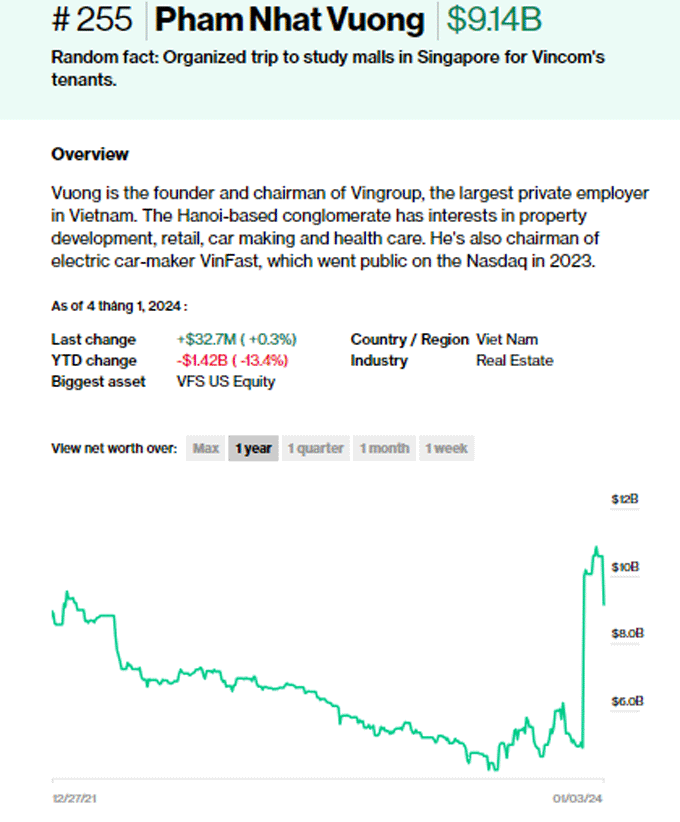
Vuong was named in Bloomberg Billionaire Index, the ranking of the world’s billionaires released January 3, 2024, with assets worth $9.1 billion.
Vuong, president of Vingroup, the largest private corporation in Vietnam which invests in many fields, including real estate, digital technology and automobile manufacturing, is now ranked 255th.
Vuong’s asset value has soared, which has placed him in the list of 500 global billionaires as Bloomberg counted his assets from VinFast Auto, an electric vehicle manufacturer and subsidiary of Vingroup.
Bloomberg did not calculate Vuong’s assets at VinFast over the last months. The electric vehicle manufacturer went public on Nasdaq in August 2023. The VinFast share price has been fluctuating heavily since the listing. It soared from $23 per share at the debut to $90 per share later, but sometimes dropped to $5 per share.
The share price has been stable at $7-8 per share recently.
Bloomberg explained that the asset of $9 billion is formulated from Vingroup shares (VIC) and VinFast (VFS). Vuong now holds 45 percent of VinFast’s charter capital. To avoid double counting, Bloomberg doesn’t count the number of shares Vuong is controlling VinFast via Vingroup.
Meanwhile, according to Forbes, Vuong had $4.6 billion as of January 3. Analysts said the institution might not have counted VinFast stocks when calculating Vuong’s assets.
In late August 2023, Forbes reported that Vuong’s assets reached $66 billion. Vuong was once positioned at 16th on the list of the planet’s richest billionaires and second in Asia as VinFast had capitalization value of over $200 billion.
However, Forbes has re-calculated and considered VinFast an unlisted private company in the context of VFS price heavy fluctuations.
According to Forbes, the adjustment of Vuong’s assets was made at that time because the number of shares freely circulating was small, just one percent. The figure has increased recently in accordance with a roadmap, though it is still small.
According to Forbes, as of January 3, Nguyen Dang Quang, president of Masan Group, (MSN) had $1 billion. This means that Vietnam has one more US dollar billionaire.
In fact, Quang was named on Forbes’ list of billionaires many years ago with assets ranging from $1 billion to $1.9 billion. However, as the MSN price fluctuated all the time, Quang was excluded and included many times in the list.
In late 2019, Quang was weeded out from the list after he first was added to the list in 2018. His biggest asset recorded so far is $1.9 billion, gained in April 2022.
Quang was born in 1963 in Quang Tri. He obtained a doctorate in nuclear physics from the Belarusian Academy of Science. After graduation, he stayed in Russia and started a business in the 1990s by selling instant noodles to Vietnamese. Later, he poured capital into soybean, fish and chili sauce production.
Masan Group (MSN) became one of the largest consumer goods manufacturers and retailers after it took over Vinmart, the retail chain, from billionaire Pham Nhat Vuong and renamed the chain Winmart.
Reports show that Quang holds only 15 MSN, but he is indirectly holding a large amount of MSN via Masan JSC and Hoa Huong Duong, nearly 45 percent of Masan’s shares. He is also holding 9.4 million Techcombank shares (TCB).
His wife, Nguyen Hoang Yen, holds 42 million MSN. In addition, Quang also directly holds shares of Masan Consumer (MCH) and Tam Nhin Masan.
As of January 3, 2024, Vietnam had six US dollar billionaires, according to Forbes.
Besides Vuong and Quang, the other four dollar billionaires include Vietjet Air’s (VJC) Nguyen Thi Phuong Thao ($2.4 billion), president of Hoa Phat Group Tran Dinh Long ($2.3 billion), president of Thaco Tran Ba Duong ($1.5 billion), and president of Techcombank Ho Hung Anh ($1.4 billion).
The list of Vietnamese stock billionaires by the end of 2023 published by Vietnamese media includes the above-mentioned six businesspeople. The other four include Bui Thanh Nhon, who was named on Forbes’ list; Vu Thi Hien (Long’s wife); Truong Gia Binh (president of FPT), and Nguyen Van Dat (PDR).
In 2023, Vietnamese businesspeople faced difficulties because of the slow economic recovery. The total stock assets of top 10 billionaires decreased slightly though the VN-Index increased by 12 percent.
Manh Ha